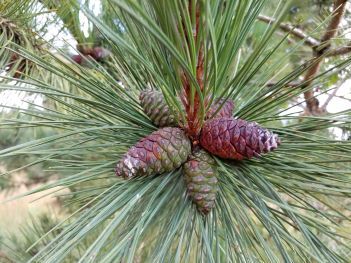By GABRIELLE AHLBORN
Capital News Service
LANSING — Strapped for cash? The answer could be waiting in your backyard.
In some states, including Michigan, the Department of Natural Resources runs an annual seed collection program. Anyone with a dry container can collect pine cones and seeds from trees and redeem them for cash.
Programs are also available in Indiana, Minnesota and Wisconsin. Requirements for collection vary by state and species, but all seeds must be collected from trees of natural origin, not planted.
“Seed source is really important in this type of work,” said Mike Reinikainen, the silviculture program coordinator for the Minnesota DNR. “You need to know that the seed is adapted to the local climate.”

Michigan Department of Natural Resources
Cones on a red pineSeeds from planted trees are less likely to survive because they’re often shipped in from areas with different soil nutrients and air moisture.
Minnesota’s program has been available for over 75 years, and Reinikainen said many people collect cones and seeds as a family activity.
“You have like three generations of people that would do it,” Reinikainen said. “So you have that transfer of knowledge from one generation to the next.”
Most species are collected in the fall, but some can be harvested as early as June, such as the silver maple, or as late as January, like the green ash. In the 2020-21 season, Minnesota purchased 2,460 bushels of cones and seeds across the state.
Besides being a fun outdoor activity, collectors can earn from $5 to $300 per bushel, which is a little over 9 gallons of seeds.
“It’s basically a matter of how hard it is to come by,” said Roger Bohringer, the manager of the Wilson nursery in Boscobel, Wisconsin. “If it’s harder to find, we pay more for it.”
The Wilson nursery is one of the many locations in Wisconsin that raises the collected cones and seeds into saplings.
“Typically, we grow them for one to three years depending on the species,” Bohringer said.
Purchase prices are also affected by how in-demand the grown saplings are.
“In my last few years, black spruce has been at the top of the list,” Reinikainen said. “It’s always in demand for projects on state land and county land, so it’s been in short supply.”
Black spruce cones can go for $85 a bushel in Minnesota and $200 a bushel in Wisconsin.
In one drive, the Michigan DNR sought cones from red pines so foresters can “replant the forest and replenish the supply of red pine seed,” a species in high demand.
The department says that “fresh cones can be found in felled treetops from recent timber sales, on state forestlands and in recently gathered squirrel caches — yes, you can steal from a squirrel.”
It advises:
- “Make sure you’re picking the right species. Red pines have craggy, reddish bark and 4- to 6-inch needles that grow in pairs. Scotch and Austrian pine cones will not be accepted.
- Cones should be picked off the tree. Fallen cones are likely to be too old or wet.
- Cone scales should be closed, with a little bit of green or purple tint — all brown and open, and they’re too far gone.”
Gabrielle Ahlborn writes for Great Lakes Echo.